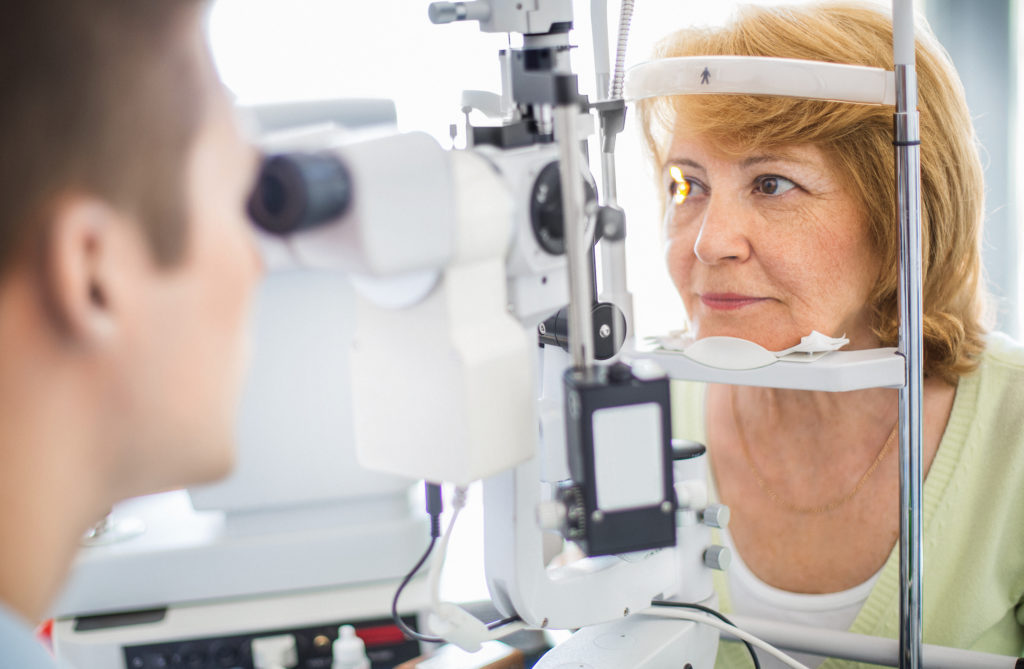Cataract Surgery in Dallas, Texas
Cataracts Dallas, TX

When the naturally clear flexible lens of the eye becomes dense, cloudy, and loses its transparency it is called a Cataract. Symptoms of a cataract include blurred or hazy vision, diminished color vision, and glare. These symptoms are often worse in low light conditions or night. Cataract surgery at Infinity Vision Dallas in Dallas, Texas should be considered when daily activities are affected by decreased vision.
What is a cataract?
Cataracts are the leading cause of vision loss in people over the age of 40 and the condition is the principal cause of blindness worldwide. A cataract is a clouding of the eye’s natural lens, which lies behind the iris and the pupil. The lens is the transparent film that focuses the images as seen by the eye on the light-sensitive retina at the back of the eye. Over time proteins build in the lens, forming clumps. These clumps grow and begin to prevent the lens from sending clear images to the retina. As the cataract increases cloudiness, it begins to affect vision, especially at night.
A cataract develops slowly and the person doesn’t see any initial symptoms. Plus, their vision is clouding so slowly that they don’t notice the changes until it really impacts their vision. Cataracts can develop in both eyes, but they don’t usually form at the same time or at the same rate in both eyes. Development of cataracts is fairly universal in older people.
Contact us to schedule Your consultaion
What are the symptoms of cataracts?
Cataracts cause a progressive, painless loss of vision, along with these symptoms:

- Blurry vision
- Trouble with night vision
- Fading of color
- Increased sensitivity to glare
- Halos surrounding lights
- Double vision in the affected eye
- A need to frequently change eyeglass prescriptions
- A feeling as if there is a film over the eye
Are some people more at risk of developing cataracts?
Cataracts are quite common. In fact, by the time a person in the U.S. turns 80 they have a 50/50 chance of having cataracts or they have already undergone surgery to remove the clouded lens.
Still, there are some things that make people more likely to develop a cataract:
- Smoking
- Diabetes
- Obesity
- Excessive alcohol use
- Excessive sun exposure
- Exposure to radiation from x-rays and cancer treatments
- Family history of cataracts
- High blood pressure
- Previous eye injury or surgery
- Prolonged use of corticosteroid medications
Cataract Eye Surgery Procedure
- Relaxation medication is given along with topical anesthetic eye drops.
- A tiny incision (less than 1/8 inch) is made at the edge of the cornea.
- Ultrasound is used to emulsify or liquefy the cloudy cataract.
- An intraocular lens implant is then folded and placed securely inside the original lens capsule.
- Antibiotics are placed inside the eye and the incision is sealed naturally by the internal pressure of the eye.
Who is an ideal candidate for cataract surgery?
 After you have your 60th birthday, the odds are very high that you already have a cataract developing in at least one of your eyes. This can even be more prevalent in a sunny place like Dallas, as exposure to the sun’s ultraviolet rays plays a role in cataract development.
After you have your 60th birthday, the odds are very high that you already have a cataract developing in at least one of your eyes. This can even be more prevalent in a sunny place like Dallas, as exposure to the sun’s ultraviolet rays plays a role in cataract development.
So when is the right time to have your cataract removed and replaced by an intraocular lens? That is up to the individual, but when the clouding begins to affect your life it would be a good idea to have cataract surgery. If your night vision is becoming more and more difficult, it’s time to have surgery. Plus, there isn’t any reason to put it off and deal with vision that looks as if you are looking through a dirty window. Cataract surgery is one of the most successful surgeries performed around the world; the procedure is fast and very precise; and recovery is not difficult. Every day you wait is another day your vision isn’t as good as it could be. In fact, today’s technologically advanced intraocular lenses are so advanced they can correct refractive errors and allow focusing at multiple distances. They can even correct for astigmatism.
How do I prepare for cataract surgery?
Before your surgery, we’ll conduct a number of tests at Infinity Vision to determine which intraocular lens options will work for your situation. It will also be up to you to do some research so you have the information you need to select the type of replacement lens you want. Dr. Russell or Dr. Winslow will discuss your options, but you’ll need to make the final decision.
You’ll need to tell us any medications or supplements you are taking, as they may have to be stopped for a few days. We may give you eye drops or medication to take the night before your surgery, and you’ll have to fast after midnight. The final preparation is to arrange a ride to and from Infinity Vision. It’s wise to have someone at your home for the first day or so after your procedure, as well, as your vision can be blurry.
Cataract Removal at Infinity Vision
Infinity Vision Dallas has been on the cutting edge of modern cataract surgery performing ‘no stitch’ cataract surgery since 1991 and ‘no shot, no patch’ cataract surgery exclusively since 1994. These techniques maximize quality vision while minimizing risk. We were one of the first practices in the U.S. to use aspheric intraocular lenses (IOL) to correct vision after cataract surgery. Aspheric optics have become the worldwide ‘gold standard’ to produce high quality, high contrast vision.
Call Today to Schedule Your Appointment
Recovery
Full activities, except driving on the day of surgery, can be restarted immediately. Eyedrops are used to promote proper healing. A follow-up exam in the office is arranged within 48 hours.
How long before I can drive after cataract surgery?
You’ll need to wait to drive until your follow-up appointment after your surgery. This usually is the day after your surgery. You’ll be amazed at how good your vision already is. After that appointment, we will probably green light you for driving.
What are the risks involved with cataract surgery?
Cataract surgery is very safe and successful, returning clear vision to patients who have been dealing with increasingly cloudy vision. Complications are rare, and when something does occur it can usually be corrected. Your risk of complication is greater if you have another eye disease such as macular degeneration or glaucoma.

These are the risks with cataract surgery:
- Inflammation
- Infection
- Bleeding
- Swelling
- Drooping eyelid
- Dislocation of the IOL
- Retinal detachment
- Glaucoma
- Secondary cataract
- Loss of vision
For more information on getting your cataract surgery in Dallas, Texas by one of our cataract surgeons, call (214) 522-2661 or fill out a Contact Form here.
Patient Reviews

Very thorough, high-tech equipment, conservative treatment philosophy, knowledgeable doctor, good bedside manner. All-in-all, an excellent physician for eye problems. Met my wife and me on an emergency basis on a Sunday morning.

Dr. Russell is an excellent doctor with a wonderful bedside manner. He did cataract surgery on my eyes and he knows cutting edge procedures. I can’t imagine that there is a better doctor in Dallas. The entire office staff is like a loving family. Great experience!




